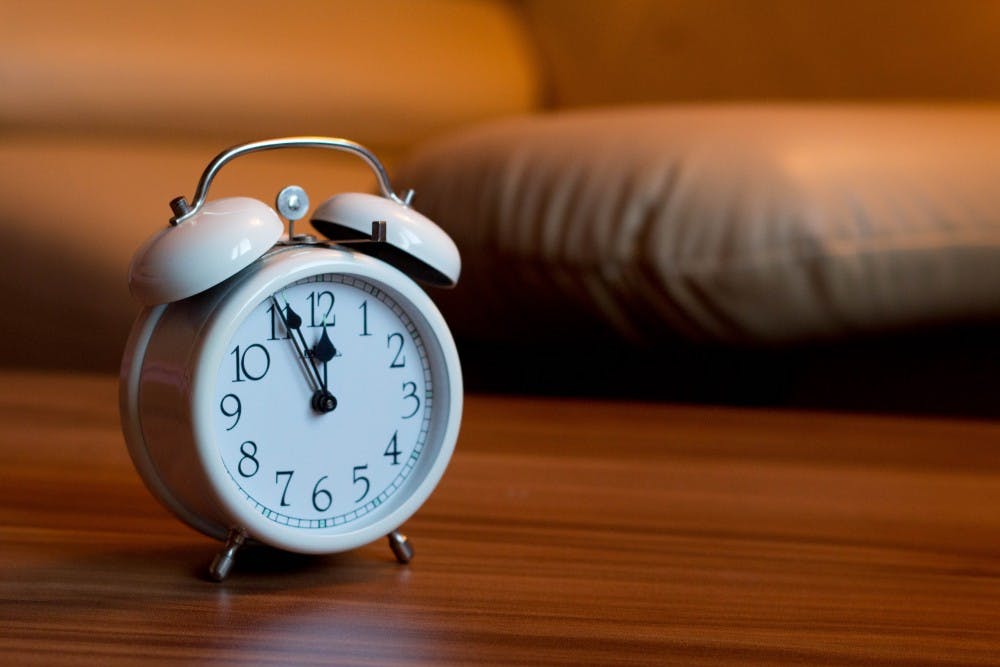For most Penn students, 9 a.m. class in DRL is as bad as it gets. But for students with early–morning jobs, 11 p.m. bedtimes and brisk walks before sunrise are only the beginning.
Ilona Jileava (C’18) explained that having a 20–hour a week job could mean sacrificing a typical college experience, especially if that job requires you to wake up at 6 a.m. most mornings to walk across the Schuylkill River regardless of weather.
“The most difficult part is keeping a social life, when I know I need to go to bed at 11 to wake up for work,” Ilona said. “I can’t just go out with my friends on a Wednesday or Thursday night, so I end up feeling like I am missing out on a lot.”
On top of her busy schedule as a pre–med senior taking a full schedule of classes, Ilona works for the Center for Autism Research as a clinical assistant. Before this year, Ilona worked a number of work–study jobs at Children’s Hospital of Philadelphia and Penn Medicine.
While it was difficult adjusting to Penn’s workload as a freshman with the added stress of a job, she always chose to work the maximum number of hours allowed by work study.
“It was really hard at first, but choosing to work the maximum number of hours I can is the only way I can even attempt to keep up with the Penn lifestyle.”
That isn’t to say a busy schedule is without perks. Ilona explained her work experience helped her develop valuable time management skills that will help her in the future, especially in medical school. “I do so much every day before a lot of people wake up,” she joked.
Taylor Salomon (C’20) also knows a thing or two about waking up at what most college students would call “the middle of the night.” Taylor wakes up at 5:45 am on Mondays, Tuesdays, and Wednesdays, to walk to her job at WXPN radio station. By 6:30 am she arrives at her office on 30th and Walnut, where she has to text her boss and then wait outside to be let in.
Usually, it’s quick, but sometimes her boss forgets her, leaving her to wait outside imagining her friends still in bed asleep. “It’s better now, but it was kind of depressing at the beginning of the semester because it would still be really dark,” she said.
Working from 6:30 a.m. to 10:30 a.m. three days a week means Taylor can’t schedule morning classes, but she puts the time to good use.
“After I’m done doing work I can get a lot of work done before class, which makes me feel really productive,” she said. “It honestly hasn’t really negatively affected my sleep either because my sleep schedule was really not so good before either.”
Like Ilona, Taylor found the impact on her social life the most difficult. “I’ve really loved working at XPN and hope to keep working there, but I definitely don’t feel like a regular college student while I’m working like this,” she said. “There are just a lot of little things I feel like I miss out on like when people want to hang out after they finish doing work at night. I’d love to, but I need to be asleep.”
While Ilona and Taylor might feel like outliers, for Penn’s undergraduate nursing students, early morning alarms are merely part of the curriculum. Avital Stein (N’19) has had clinic hours that required her to be at the Children’s Hospital of Philadelphia at 5:45 a.m. and a hospital in Camden, New Jersey by 6:30 a.m.
This semester, Avital has 26 hours of class including a 12–hour clinical rotation, which means she’s at the hospital from 6:30 a.m. to 6:30 p.m. on Thursdays. Her secret? Lots of coffee and occasional productive breakdowns. That, and the fear of a $300 fine for being late.
“I end up running a lot in the mornings because I tend to oversleep,” Avital said. “I stop at Wawa on the way to get coffee and then another coffee with an extra shot at the hospital.”
To wake up, Avital sets “15 alarms” and waits for the stress of being late to force her out of bed. She explained that it is especially frustrating trying to schedule classes around her clinic hours.
“You moan and groan and get through it,” she said. “We all have different types of stress at Penn, so I think it’s just something you have to get through.”

